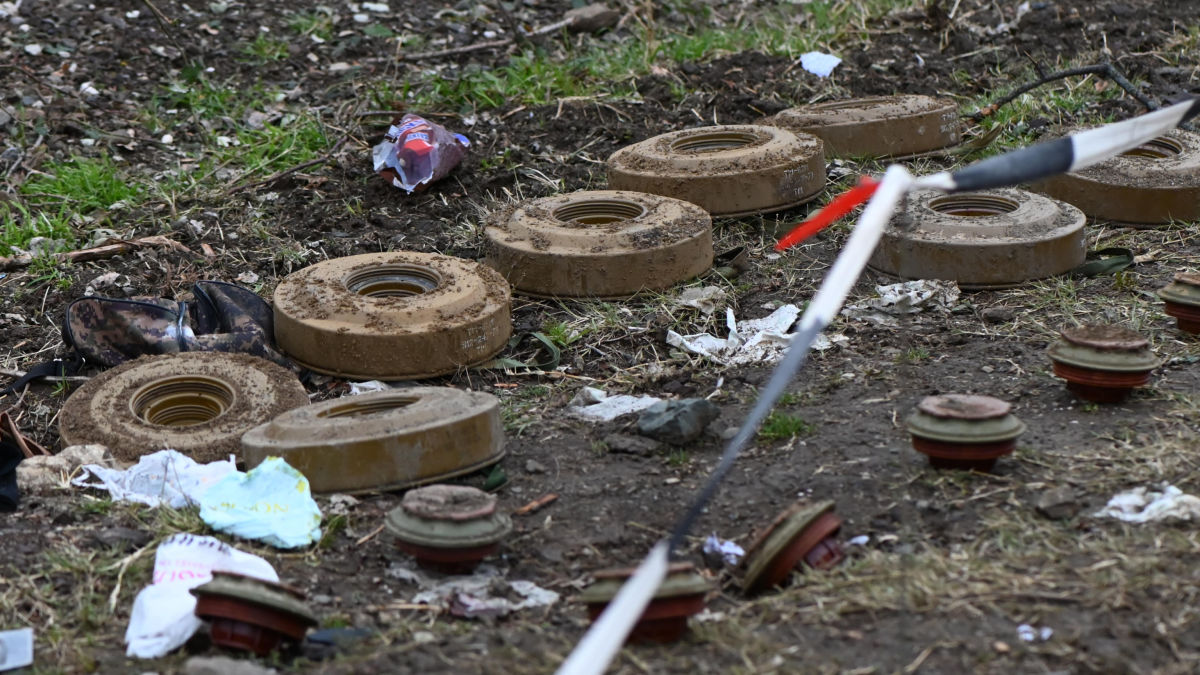The 12 June Armenian-Azerbaijani deal: larger implications

Armenia has finally agreed to hand over minefield maps, albeit just for one district, planted in Karabakh during its 30 year-long occupation of the region in exchange for the release of 15 Armenian detainees. For a long time, Yerevan had been refusing to acknowledge the existence of those mine-laying records, with Armenian Ministry of Foreign Affairs even going so far as to insist that it was just a fake agenda pushed by Azerbaijan to mislead the international community. However, in the end, it turned out that those minefield maps did, in fact, exist. On June 12, Azerbaijan’s Ministry of Foreign Affairs announced that “in exchange for providing Azerbaijan with maps of 97,000 anti-tank and anti-personnel mines in the Aghdam region, 15 detained Armenians were handed over to Armenia on the Azerbaijani-Georgian border with the participation of Georgian representatives.”
The demining of the liberated lands has been an urgent matter and priority task for the Azerbaijani government after the war. Azerbaijan’s ambitious plans for post-conflict restoration, reconstruction, and economic reintegration of Karabakh requires demining work to be completed as fast as possible, which is a major problem since Karabakh is one of the most mined areas in the world. Without considerable demining, it would be nearly impossible for the IDPs and refugees to return to their homeland; foreign investment-funded projects would also be jeopardized.
For Azerbaijan, the conflict with Armenia is essentially over. Baku is seeking to normalize its relations with Yerevan based on the principles of territorial integrity and inviolability of internationally recognized borders of each other. However, the current government of Armenia is still trying to reanimate the conflict rhetoric for political purposes, while the Armenian revanchist forces are openly working to misrepresent the trilateral statement as a temporary ceasefire agreement before the inevitable next war when they hope to retake all the “lost territories” and achieve their version of the “final solution”. In this vein, Armenia’s refusal to cooperate on the matter of mines and share the mining records to guide demining process until now, along with Yerevan’s unwillingness to give up occupied territories and start the process of delimitation and demarcation at the borders, has been a net drag on the peace process, risking to blow up the whole situation.
In its statement, Azerbaijan’s MFA underscored the role played by Georgia, the US, the EU, and the Swedish Chairmanship of the OSCE in getting the deal done. ‘We appreciate the support of the Georgian government headed by the Prime Minister of Georgia Irakli Garibashvili for the implementation of this humanitarian action. At the same time, we especially note the mediating role, first of all, of the US Secretary of State Antony Blinken, Acting Assistant Secretary of State for European and Eurasian Affairs Philip Reeker, President of the European Council Charles Michel and the Swedish Chairmanship of the OSCE for their contribution to the process,” the statement read.
Commenting on the deal, Irakli Garibashvili, Prime Minister of Georgia, noted that Georgia was proud of the role Tbilisi played in close coordination with “our strategic partner the U.S.” to make the exchange happen. Azerbaijan has always considered Georgia a backbone of its ambitious regional integration projects so Tbilisi’s involvement in getting this deal done is in line with Baku’s broader geopolitical and geoeconomic vision for the South Caucasus. Just recently, commenting on the possibility of trilateral cooperation between Georgia, Azerbaijan, and Armenia, President Ilham Aliyev pointed out that “until now we had relations with Georgia, Armenia had relations with Georgia, and no relations and no cooperation between Azerbaijan and Armenia. Maybe now, it’s time to see whether it’s possible to have a kind of a trilateral format of cooperation. We are ready for that.” Without doubt, Baku is strongly in favour of Georgia’s playing an active role in the process, since by virtue of being a small country with its own territorial problems and deep, genuine interest in regional peace it could add legitimacy to any conflict resolution attempts.
Although Russia did welcome the deal, Moscow apparently was not involved in the exchange process. Russia’s notable absence from the June 12th agreement could be a signal to the Kremlin that Baku doesn’t want to fall into dependence on them too much in order to hedge against future uncertainties. There have been serious efforts to convince Baku to join the Eurasian Union and maybe even the CSTO (such talks have been made by some high-ranking officials in Moscow and pool of pro-Russian experts in Baku) recently, but this agreement shows that Azerbaijan does not want to be forced into the situation when its room for maneuver would be severely limited, particularly in such issues as mediation with Armenia where the Kremlin has always wanted to play an exclusive role.
Since the end of the war, both Azerbaijan and Turkey have been pushing for greater involvement of the West in the region to offset Russia’s growing influence. Just recently President Ilham Aliyev has noted that both the U.S. and the European Union could play a crucial role in the regional post-conflict development, adding that Azerbaijan is ready to sign a peace agreement with Armenia, which could be done in a “in a relatively short period of time” and that the U.S. could convince Yerevan that it is the only way forward.
It is clear that the US is going to take a relatively more proactive position in the region than it used to under Obama and Trump, and the fact that the news of the exchange came shortly after Riker’s visit to the both countries attests to that. At the same time, the US must understand that by endlessly catering to Armenia’s unwillingness to compromise, they will only lose moral legitimacy in Azerbaijan and push the whole region tighter into Moscow’s embrace. “The U.S. welcomes the release by Azerbaijan of 15 Armenian detainees. We're grateful to the Government of Georgia for its vital role facilitating discussions between the sides. Such steps will bring the people of the region closer to the peaceful future they deserve,” Antony Blinken, the US Secretary of State, wrote on Twitter, prompting criticism over his failure to mention the issue of landmines. That said, the official statement by the US State Department did welcome Armenia’s decision to share information on landmines with Azerbaijan.
It’s vitally important for the US and Europe to adapt their position to the new regional realities if they don’t want to lose the South Caucasus completely. In this vein, President of the European Council Charles Michel’s positive role in South Caucasus affairs recently has been particularly praiseworthy. Reacting to the news of the exchange, Charles Michel noted that “I applaud Azerbaijan’s & Armenia’s parallel humanitarian gestures - releases of detainees and maps of mined areas. First step towards renewing confidence @presidentaz & @NikolPashinyan. The EU has supported this process and will continue to offer assistance to enhance progress.” Charles Michel’s critical role in finding a solution to the long-lasting political crisis in Georgia just a few months ago, in which his actions were characterized as “mad”, and his close involvement in getting Armenia to hand over landmine maps in exchange for POWs demonstrate that the Western leaders might still play a very constructive role in the region, particularly when it comes to working out diplomatic solutions to seemingly intractable problems.
Michel’s effectiveness is especially jarring when compared to French President Emmanuel Macron’s recent controversial and largely disruptive solo responses to regional developments that left France alienated from the conflict resolution process, as it has not been mentioned among the parties facilitating the talks. In this context, it is not unreasonable to assume that the damage done by Macron and other Western politicians to the West’s role in the peace process might have pushed the EU and the US to accelerate their activities in order to repair the West’s image in the region. Just recently President Ilham Aliyev warned that trying to push the narrative of an unresolved conflict by external actors is very dangerous. The only goal of this narrative is to entrap the region in the never-ending cycle of violence and destruction. “If this conflict is not resolved, what should be the settlement of this conflict? Does this mean that the statement signed on November 10 has expired? That is, I can understand it this way. On November 10, a document was signed on a de facto settlement of the conflict. This is not just a ceasefire document, although some would like to present it that way. Let them open their eyes, see how many clauses there are. There is only one clause in a ceasefire document - the ceasefire, and that's it. There are many clauses here. There are clauses that cover the solution of many issues, including the opening of communications. If the conflict is not resolved, what kind of communications can we talk about?” President Ilham Aliyev wondered. Urging Yerevan to not back down from its deeply irresponsible, unproductive and self-destructive path is a dangerous pathway that could lead the region to nowhere, while preventing a new paradigm of peace and prosperity from becoming a dominant narrative in the South Caucasus.








